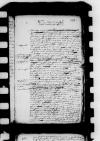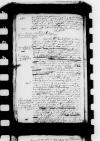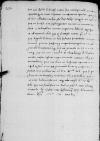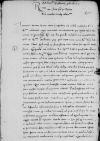Letter #1778
[Ioannes DANTISCUS] to Antonio PUCCILöbau (Lubawa), 1537-11-16
English register: Dantiscus is asking the cardinal protector for his help in arranging for a reduction in the amount of annates for himself and Tiedemann Giese. He argues that the bishops’ income has decreased substantially as a result of the last two wars and the development of Lutheranism in the territories neighboring upon the Chełmno and Warmia dioceses. Dantiscus points out that though he paid the required 700 ducats for the provision for the Chełmno bishopric, his predecessors took advantage of substantial reductions due to the devastation of the bishopric estate. He also notes that the Warmia bishop, who is in a much better financial situation than the Chełmno bishop, pays just 400 ducats for his confirmation. The amount of the fee for the Chełmno bishopric seems all the more unjust to Dantiscus when the annual income of the Chełmno bishop barely reaches the required fee of 700 ducats. Dantiscus asks for support for the activity of his plenipotentiary in Rome, Dietrich von Rheden. He recalls the great kindness shown to himself by the cardinal protector during the coronation of the emperor (Charles V) in Bologna, and is counting on his continued kindness.
Manuscript sources:
Auxiliary sources:
Prints:
| ||||||||||||
Text & apparatus & commentaryPlain textText & commentaryText & apparatus
Ad
Reverendissime in Christo Pater et Domine, domine modis omnibus colendissime.
Tametsi verear cum nulla in re de Dominatione Vestra Reverendissima sum benemeritus hanc meam scriptionem non nihil molestiae Dominationi Vestrae Reverendissimae allaturam,
cogit me tamen rei cf. Adagia 1526 No. 1240 ingens telum necessitas – – de reinevitabili; Adagia 1526 No. 1241 adversum necessitatem ne dii quidem resistunt ⌊necessitas, quae ingens telum est et cui, ut proverbium written over o⌈oumum written over o⌉ habet superinscribed in place of crossed-out est⌈esthabethabet superinscribed in place of crossed-out est⌉, ne dii quidem resistuntcf. Adagia 1526 No. 1240 ingens telum necessitas – – de reinevitabili; Adagia 1526 No. 1241 adversum necessitatem ne dii quidem resistunt ⌋, ea in notitiam Dominationis Vestrae Reverendissimae deducere, quae cum meis tum etiam reverendissimi
ms 2 omitted⌈a hidden by binding⌈[a]a hidden by binding⌉dms 1 [a]d,
ms 2 omitted⌉ quo<d> se vix totus ecclesiae reditus extendit in next line in place of crossed-out ...⌈... illegible⌈...... illegible⌉ditdit in next line in place of crossed-out ...⌉septingentorum aureorum, [a]d quo<d> se vix totus ecclesiae reditus extendit on the margin⌉, soluere pro confirmatione in officiorum libris constitutam adactus fuerim, quod quidem superinscribed⌈quidemquidem superinscribed⌉ vel adverso casu ac fortuito on the margin in place of crossed-out meo infortunio⌈meo infortunioadverso casu ac fortuitoadverso casu ac fortuito on the margin in place of crossed-out meo infortunio⌉, vel potius quorundam avaritia aut superinscribed⌈potius quorundam avaritia autpotius quorundam avaritia aut superinscribed⌉ procuratorum[2] meorum ignorantiae inscitiave superinscribed in place of crossed-out suae inscitiaeque imputo⌈suae inscitiaeque imputoinscitiaveinscitiave superinscribed in place of crossed-out suae inscitiaeque imputo⌉ commissum esse oportuit. Ecclesia enim Culmensis Quam taxam si successor meus onerari deberet, nihil fieri posset iniquius magis ab aequitate alienum, praedecessores enim mei post bellum ... superinscribed⌈... illegible⌈...... illegible⌉... superinscribed⌉ Prutenum ante novissimum on the margin⌈ante novissimumante novissimum on the margin⌉, quod quattuordecim hic annis perduravit[3] et ecclesiam Culmensem superinscribed⌈CulmensemCulmensem superinscribed⌉
bonaque eius adeo extenuavit, quod vix sustinere poterant superinscribed in place of crossed-out possent⌈possentpoterantpoterant superinscribed in place of crossed-out possent⌉
episcopum, gratuito fere et parvo dispendio confirmationes suas a
ms 2 incomperabili⌈incomparabilims 1 incomparabili,
ms 2 incomperabili⌉ prudentia aequitateque in omnes dispiceret ac reputaret apud se. Quam gratiam ob has adductas causas istae duae ecclesiae, maxime autem
Culmensis, quae, ut scripsi, vix septingentos aureos in annuis habet reditibus censibus, a
ms 2 Theodoricus⌈Theodericusms 1 Theodericus,
ms 2 Theodoricus⌉ de Rheden BCz, 244, p. 300
Qua fretus has prolixiores ad Dominationem Vestram Reverendissimam dedi, quae si quid amplius in me beneficii contulerit, omni gratitudine, cum melius res meae habere ceperint, atque adeo re ipsa Dominationi Vestrae Reverendissimae respondebo. Cui me summopere ut domino et patrono meo plusquam colendissimo commendo.
BCz, 244, p. 300
Qua fretus has prolixiores ad Dominationem Vestram Reverendissimam dedi, quae si quid amplius in me beneficii contulerit, omni gratitudine, cum melius res meae habere ceperint, atque adeo re ipsa Dominationi Vestrae Reverendissimae respondebo. Cui me summopere ut domino et patrono meo plusquam colendissimo commendo.
Ex
[1] Fees for church benefices – annates – were introduced in 1316 by Pope John XXII. The beneficiary’s formal pledge to pay the annates was the necessary condition of receiving a provision bulla for the new office. Starting from the Council of Constance (1414-1418), annates from higher-ranking benefices were to be paid in two annual installments at the Apostolic Camera in Rome. The amount of annates was specified for every benefice, though information was also gathered about the actual situation of each beneficiary and analyzed at the consistory during which the provision was to be settled, and this is doubtless where Dantiscus saw a chance for reducing the fee (cf. Dudziak; further references there). Applications for a reduction to the fee seem to have been widespread at the time, as shown, for example, by the Polish episcopate’s letters to the pope in 1537 (cf. VMPL, No. DLXXX, DLXXXI, p. 520-523). See also cf.
[2] Dantiscus’ plenipotentiaries in the Holy See in 1530 were Stanisław Rzeczyca, Polish penitentiary in Rome, and Ioannes Colardus, papal scriba. Their efforts on behalf of Dantiscus have been discussed on the basis of the correspondence published in cf. AT 12 ⌊AT (vol.XII)cf. AT 12 ⌋, in the doctoral dissertation by Hieronim Fokciński Procedura nadawania godności biskupich w XVI w. (Fokciński).
[3] The Polish-Teutonic war of 1454-1466, called the Thirteen Years’ War and not – as Dantiscus writes – the Fourteen Years’ War.
[4] After Varmiensis – proofreading mark superinscribed and then crossed out
[5] The Polish-Teutonic war of 1519-1521.
[6] For more about Dantiscus’ participation in the ceremony during which Charles was crowned as emperor (February 24, 1530) cf. e.g. cf. AT 12 No. 65, p. 77-79 ⌊AT, XII, No. 65, p.77-79cf. AT 12 No. 65, p. 77-79 ⌋.
[7] XVI Novembris added later in the same hand in a specially left space.



